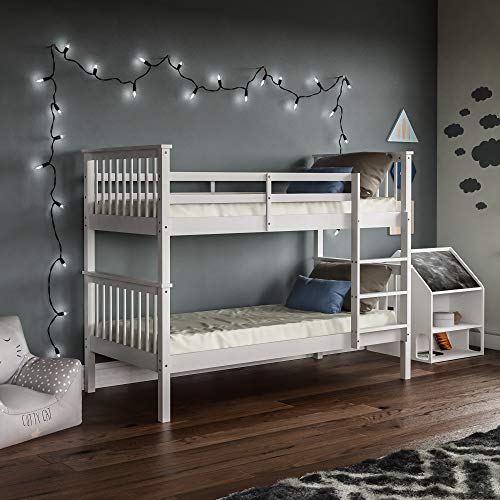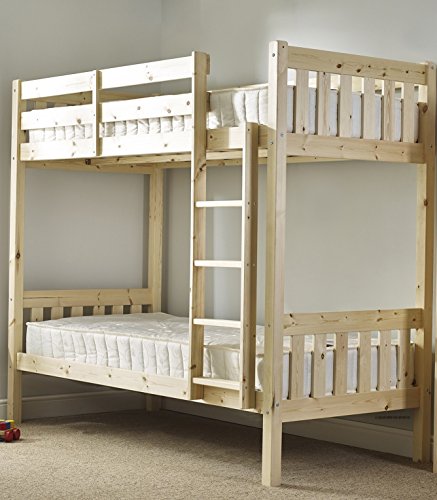Choosing a Bunk Bed For kids bedroom furniture
A bunk bed can bring siblings closer and give them the feeling of adventure. It can also be able to accommodate a full or twin mattress at the bottom for sleepovers.
But before you shop for bunk beds for your children, think about these important safety guidelines. Make sure that the ladder and stairs attach firmly to the frame, and that any gaps in guard rails aren’t large enough for strangulation.
Safety
Bunk beds are a great space saver for kids However, they can be dangerous if not properly set up and supervised. Always select beds with full-length guardrails on both the top and bottom bunks. Look for a bunk bed that has been inspected for safety by a third-party lab and meets all CPSC requirements. If you can, put the bunk beds in a room without windows or doors. This will stop children from leaving their beds at night.
Take into consideration the capacity of your children’s weight and their age when choosing a bunk bed. Some bunk beds are designed for children, while others can accommodate adults and teens. Decide if you prefer a trundle on the bottom, or one mattress for the two beds. If you are planning to use the bed for more than two children, ensure that the beds are compatible and that there is enough room in the room for both beds.
Certain children are more for the top bunk than others, and it’s crucial to check their readiness for a childrens bunk bed bed regularly. Experts generally recommend that children less than six years old should shouldn’t sleep on the top Bunk beds usa (http://www.cowgirlboss.com) as they may not have the coordination and spatial awareness necessary to safely navigate the ladder and height of the upper bed.
If your children have friends frequent visits, ensure they know the rules of bunk beds, such as not using the ladder, and not hanging or rough-housing off the guardrails. Make sure your children keep jewelry, belts and jump ropes off of the bunk bed. These items can be strangulation hazards. For added peace of mind, some bunk beds have stairs instead of ladders and can be an excellent alternative for children who struggle climbing. Lights for night can be put on bunk beds for kids to assist them in safely getting to and from the top bunk during the night.
Space-Saving
 Bunk beds make the most of the area, making space for play and study. This isn’t just ideal for children’s bedrooms however, it can also be used to create a focal point for a living room or dining area.
Bunk beds make the most of the area, making space for play and study. This isn’t just ideal for children’s bedrooms however, it can also be used to create a focal point for a living room or dining area.
When selecting the right bunk bed for your kids, consider your space’s dimensions and their age. Around the age of six or eight, kids begin to show the maturity and dexterity required for this arrangement. You are the only person who knows your child best, so you should assess their level of readiness and ensure they’re comfortable and confident with the change.
A lot of bunk beds come with ladders or stairs that provide easy access to the top level. They take up more space than ladders but they can be more secure for children as they learn to navigate the high of the beds. Some bunks are equipped with a slide, giving kids a thrill every time they go to bed.
If you decide to buy a bunk with stairs, go for a style that offers ample storage options as well. This design from Lucy Harris Studio includes a built-in drawer under the stairs that helps keep the bunks tidy and organized.
Incorporate a theme in the design of your bunk beds to make them feel more special. A sporty bunk is a great option for kids who love football or baseball. A fairytale bunk would be ideal for little girls. Bunks with an integrated desk are also a great option for kids bunk bed who need to complete homework or study at home.
Bunk beds are ideal for siblings who enjoy spending time together but also appreciate their independence and privacy. And when it comes to sleepovers bunk beds are a surefire option for siblings and brothers to accommodate their guests without the necessity of using the sofa or floor for sleeping arrangements. Only children sharing a bedroom with a sibling can also enjoy having friends at their homes for sleepovers.
Convenience
Bunk beds let siblings share one room without taking up valuable space. This lets children play, learn and grow with each other while enjoying their independence. It also makes it easier for parents with a busy family schedule to keep their home clean and manage their hectic schedule. Bunk beds have various features that maximize the use of vertical space and are compatible with any bedroom decor theme.
Bunk beds are a great option to make space and show your parenting style. Loft and bunk bed designs are available in a vast range of sizes and styles to fit any space, including twin over full-size beds and twin over queen beds. Some models come with built-in storage, while others give extra storage space by using the option of a separate twin or full trundle bed. These beds can also be used later in life as your kids grow out of them, as they can easily be converted into two separate single beds or a daybed.
In addition to saving you space, lofts and bunks can bring a sense of excitement and fun to any bedroom. Many kids enjoy the chance to get a seat on the top bunk and turn it into a clubhouse or a fort or even a pirate ship. They can also invite their friends over for sleepovers, and create a fun and safe environment in which they can engage in imaginative games.
Kids can also form stronger bonds with their siblings by spending more time with them in the evening. It doesn’t matter how old they are, having each others to talk to during the tough times of siblinghood can help strengthen bonds and promote emotional development. Loft and bunk beds can be particularly helpful in allowing older children to share a bed with younger siblings, as it gives the elder one the opportunity to coach the teen or tween and establish a strong relationship with them.
Ultimately, the right bunk bed for your kids depends on the ability of your child to safely climb up and down. The average child is ready to climb up the top bunk at the age of six, but it’s important to assess your child’s mental and physical development. Physical development includes coordination, dexterity and ability to climb a ladder. Mental development is based on the level of maturity and.
Style
 Bunk beds for kids can add a fun, playful touch to any bedroom. They are ideal for children who share a room, or friends who spend sleepovers together. They allow children to express their individuality through the color, theme and design they select for their rooms. There are a lot of options to consider when selecting a bunk bed for kids, including:
Bunk beds for kids can add a fun, playful touch to any bedroom. They are ideal for children who share a room, or friends who spend sleepovers together. They allow children to express their individuality through the color, theme and design they select for their rooms. There are a lot of options to consider when selecting a bunk bed for kids, including:
The most basic form of bed is a bunk bed. It’s a twin-sized set of bunk beds that are stacked on top of each other. This configuration is perfect for siblings who share rooms and allows them to easily communicate even if they’re on different floors. A lot of the standard bunk beds have customization options that make it easy to find a bed that will fit the bedroom of any child.
Some bunk beds also have specific features that make them more useful and fashionable. Some bunk beds have drawers beneath the bed to keep the space under the bunks clean and organized. It’s easy to store bedding, clothing and other items. It’s also possible to attach curtains or drapes to the bunk beds in order to provide some privacy while sleeping.
Other styles of bunk beds for kids include loft beds that raise the mattress just a few feet away from the floor. This configuration saves space and provides a great spot to study, read or just relax. You can also increase the storage space by adding shelves or a desk.
The last option is a unique themed bunk bed that fits perfectly with the overall theme of the room. Bunk beds for children can be designed to resemble trees, castles, or pirate ships to add an element of fun to any child’s room. These themed bunk beds encourage imagination and encourage creativity.
When considering whether or not bunk beds are the best option for your child, it’s crucial to consider the age of your child and maturity level. It is generally accepted that children should transition to the top bunk by the age of 6 or 7. However, you’ll have to determine if your child is ready and able to sleep on elevated furniture.
